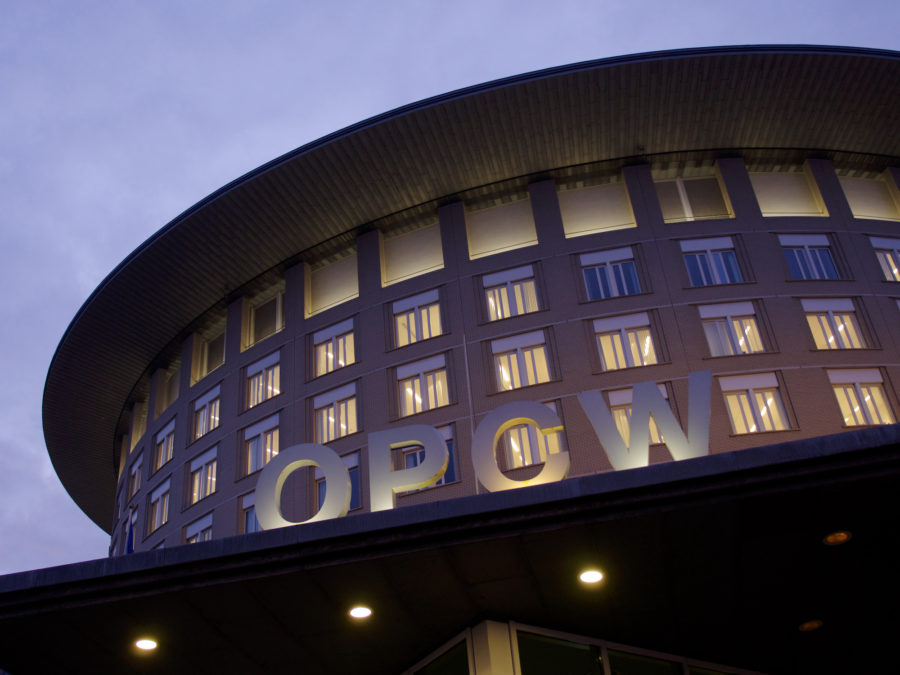19th May 2022
Twenty five years of the Chemical Weapons Convention

Paul Arkwright is an independent business consultant and former diplomat. He was British High Commissioner to Nigeria between 2015 and 2018, and British Ambassador to the Netherlands and Permanent Representative to the Organisation for the Prohibition of Chemical Weapons (OPCW) between 2009 and 2013. In 2011, he chaired the Sixteenth Session of the OPCW Conference of States Parties.
Arms Control Agreements are notoriously difficult to negotiate, and even more difficult to implement. The Non-proliferation Treaty (NPT) has struggled to curb nuclear proliferation, while some declared Nuclear powers have ramped up production of nuclear weapons, and developed new, even deadlier, forms of nuclear destruction. The Comprehensive Test Ban Treaty (CTBT) has not yet formally entered into force, pending ratification by 8 nuclear powers, including the US, although the Treaty’s primary objective, ending nuclear weapons test explosions, has been achieved – for now. Political disagreements have stymied progress in implementation of the Biological Weapons Convention for over twenty years.
By contrast, the Chemical Weapons Convention, by most measures, has been tremendously successful. It entered into force four years after signature; it has 193 states-parties; 99% of declared chemical weapons stockpiles have been destroyed; it has curbed the spread of dual-use chemical agents; its overseeing body, the OPCW, has evolved into a world-renowned centre of expertise on the investigation of alleged CW incidents and stockpile destruction. The OPCW deservedly won the 2013 Nobel Peace Prize.
And yet recent incidents in Syria, Malaysia, Russia and the UK have called into question the CWC’s relevance and the adherence of a number of States Parties to its provisions. 25 years after the CWC’s entry into force is a good moment to reflect on how to strengthen the Convention.
I spent over a decade of my UK Foreign Office career working on disarmament and non-proliferation. As the UK’s Permanent Representative to the OPCW, I chaired the Conference of States Parties in 2011-12. At the CSP in December 2011, the key issue was how to handle the certainty that Libya, the US and Russia would miss the deadline imposed by the Convention (and subsequently extended by consensus until 2012). It was a highly politicised debate, which led eventually to a rare vote on a further extension of the deadline.
Although the discussion became heated at times, I always felt that the States Parties were negotiating in good faith, and that they had the principles and objectives of the Convention at the front of their minds. There was a generally accepted view that use of CW was a taboo, and that every effort should be made to rid the world of these terrible weapons once and for all.
There was also a consensus that the Technical Secretariat at the OPCW was a non-partisan group of serious-minded scientific and verification experts, with a hugely impressive commitment to the full implementation of the Convention. This included highly valued technical assistance to low-income countries who needed help to implement the Convention’s provisions in full. The OPCW’s Nobel Peace Prize was a recognition of this fact, and widely praised as a fitting tribute to the Organisation.
Since then, the challenges to the OPCW – and the Convention itself – have sadly undermined the prevailing consensus. Syria’s frequent use of CW against its civilian population, aided and abetted by Russia, is perhaps the most flagrant breach of the CWC. Russia’s use of Novickok – including on British soil – shows Moscow’s complete disregard for the commitments it has made. The attempts of Russia and its (thankfully few) allies to denigrate and undermine the OPCW DG and his Secretariat, subverting legitimate investigations, and blocking progress across a number of technical areas, shows the depths to which Russia will sink. And the brutal invasion of Ukraine – together with thinly disguised threats to use CW again – has opened a new chapter in Russian depravity.
It’s difficult to see how the OPCW and SPs of the CWC can fulfil their obligations in these circumstances. Recent breaches of the Convention have shown that the CWC needs strengthening in a number of areas. But until there is a return to a political consensus – and a more reasonable regime in Moscow – the best the supporters of the CWC (and they represent the vast majority of the SPs) can do is work to defend the organisation, focus on the technical work that can be accomplished, and continue to show the world that developing, acquiring, stockpiling, retaining and using CW is abhorrent.
In summary, much has been gained over the past 25 years. But much is at risk. Defending, implementing and strengthening the Convention can only be to the benefit of mankind.
Note: British Embassy The Hague offers its blog platform for guest posts. The views expressed in the guest posts are those of the authors.
